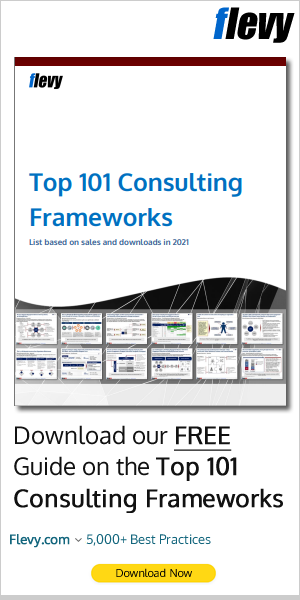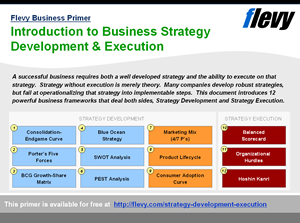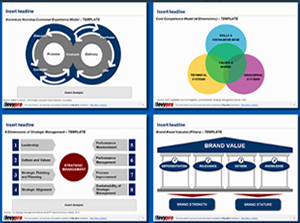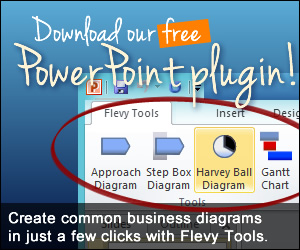Editor's Note: Take a look at our featured best practice, Digital Transformation Strategy (145-slide PowerPoint presentation). Digital Transformation is being embraced by organizations across most industries, as the role of technology shifts from being a business enabler to a business driver. This has only been accelerated by the COVID-19 global pandemic. Thus, to remain competitive and outcompete in today's fast paced, [read more]
7 Things to Remember When Developing a Mobile App for Your Business
Also, if you are interested in becoming an expert on Digital Transformation, take a look at Flevy's Digital Transformation Frameworks offering here. This is a curated collection of best practice frameworks based on the thought leadership of leading consulting firms, academics, and recognized subject matter experts. By learning and applying these concepts, you can you stay ahead of the curve. Full details here.
* * * *

Businesses feel motivated to develop their own mobile apps to enhance customer service in 19% of cases. In another 19% of cases, they build apps to boost branding efforts. Whatever the reason, creating mobile apps for your business has become vital these days.
When creating a mobile app for your business, there are several things to keep in mind. The process can be overwhelming and time-consuming, especially if you’re not familiar with mobile development. However, there are some steps you can take along the way that will help ensure your app is successful once it launches.
Know the Purpose of Your App
Before you start the development process, it’s important to know the purpose of your app. In fact, this is the first step in developing any mobile app.
Knowing the purpose of your app will help you define its features, create a user interface (UI) that users are familiar with and comfortable with, and define who your target audience is going to be. Without knowing these things in advance, there’s no way for developers to create something that fits all these needs.
Think about Your Target Audience
When developing an app, it’s important to think about your target audience. Who will be using your app, and how do they use similar apps? Developing an app for a specific purpose can help you better understand the needs of your target audience. Once you have a good understanding of who will use the mobile application (and how), it’ll become easier to narrow down what features should be included in the final product.
Determine What You Want from the App
Before building your app, it’s important to decide on the purpose of the app and define its user experience. Decide what features you want to include in your mobile application. Your goals should be measurable and attainable. It’s also important to set a budget for developing an app, so you know how much it will cost to create one that satisfies all of your requirements.
Keep Both Android and Apple Users in Mind
It’s important to remember that Apple and Android users have different preferences. While both operating systems have their own unique strengths, they also have a lot of overlap in their functionality and user experience. With this in mind, you can use this as an opportunity to create a more unified app that has unique features on both platforms while still catering to the specific needs of each platform—such as screen size or data storage limitations.
When it comes to the iPhone development stages for your app, keep in mind that you need to cater to tablet and Mac users too. The iOS environment is a closely connected one, meaning that your app should be able to connect to the user’s Mac or iPad. Thus, you must put more effort into the iOS app development stage.
Develop a Wireframe First
A wireframe is a rough outline of the way that users will interact with your app. It helps you determine what features should be included and how they’ll work. Wireframes are typically made using graphical tools. They can also be created by hand if you’re feeling old school and don’t want to use the software.
Test the App
Test the app with end users throughout the design process. To get a sense of how your end users will use your mobile application and what they need from it, you must test it early and often. Testing should happen as soon as possible, especially if this is a first-time development project for your business. The earlier you can find out what works and what doesn’t work in an app, the better off you’ll be when it comes time to release that app into the market.
Launch a Beta Version First
A beta version is the first release of an app that is sent to a limited audience. The purpose of this release is to test your app and gather feedback from users. Some companies choose to do this by releasing their apps as closed-source software and providing access only to those who have signed up for it. Others make their apps publicly available for anyone interested in testing them out.
Beta versions aren’t meant for everyone. They’re specifically designed for early adopters or anyone who wants to get involved with the development process at an earlier stage than normal users would. These users will help you discover potential bugs, errors, and glitches in your app, allowing you to correct them before officially releasing the app into the market.
More businesses will launch their own apps within the next few years. It’s estimated that 74% of businesses that currently don’t have their own apps will soon build one by 2024. Thus, if you’re delaying the development of your own business app, you’re only falling behind.
Remember that business app development and launch is a long journey, one that will take some time and patience. You don’t have to do everything at once, so start small and build up from there. As long as you stick to the tips we discussed above, the overall development process won’t feel as daunting as many find it to be.

Want to Achieve Excellence in Digital Transformation?
Gain the knowledge and develop the expertise to become an expert in Digital Transformation. Our frameworks are based on the thought leadership of leading consulting firms, academics, and recognized subject matter experts. Click here for full details.
Digital Transformation is being embraced by organizations of all sizes across most industries. In the Digital Age today, technology creates new opportunities and fundamentally transforms businesses in all aspects—operations, business models, strategies. It not only enables the business, but also drives its growth and can be a source of Competitive Advantage.
For many industries, COVID-19 has accelerated the timeline for Digital Transformation Programs by multiple years. Digital Transformation has become a necessity. Now, to survive in the Low Touch Economy—characterized by social distancing and a minimization of in-person activities—organizations must go digital. This includes offering digital solutions for both employees (e.g. Remote Work, Virtual Teams, Enterprise Cloud, etc.) and customers (e.g. E-commerce, Social Media, Mobile Apps, etc.).
Learn about our Digital Transformation Best Practice Frameworks here.
Readers of This Article Are Interested in These Resources

About Shane Avron
Shane Avron is a freelance writer, specializing in business, general management, enterprise software, and digital technologies. In addition to Flevy, Shane's articles have appeared in Huffington Post, Forbes Magazine, among other business journals.
Top 5 Recommended Documents on Mobile Strategy
» View more resources Mobile Strategy here.
» View the Top 100 Best Practices on Flevy.













